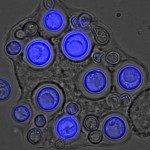Link to Pubmed [PMID] – 23024008
J. Med. Virol. 2013 Jan;85(1):8-15
The objective of this study was to evaluate the switch to once-daily darunavir/ritonavir 800/100 mg in treatment-experienced patients with suppressed HIV-1 replication on a twice-daily ritonavir-boosted protease-inhibitor (bid PI/r) containing regimen, that is in a setting where genotypic resistance test cannot be performed. In this open label, non-comparative, multicenter study, patients on a bid PI/r-containing triple combination, with suppressed viral replication, were switched to once-daily darunavir/r 800/100 mg containing triple combination. The primary endpoint was the proportion of patients with plasma HIV-RNA < 50 copies/ml 24 weeks after the switch. Intensive darunavir pharmacokinetic evaluation was performed at Week 4 (W4) in 11 patients. Eighty-five patients were enrolled. All had HIV-RNA < 50 copies/ml at screening with a pre-exposure to a median of 2 PI/r (1-5). By intent-to-treat analysis (missing = failure), 78/85 patients (92%, 95% CI [83;96]) maintained an HIV-RNA < 50 copies/ml at W24. Seven patients experienced protocol-defined treatment failure between baseline and W24: Two had confirmed low-level viral rebound, one discontinued study treatment for adverse event, three withdrew their consent, and one was lost to follow-up. By on-treatment analysis, 78/80 patients (97%, 95% CI [91;99]) maintained an HIV-RNA < 50 copies/ml at W24. Results were similar at Week 48. The median area under the darunavir plasma concentration-time curve measured in 11 patients was 61,380 ng hr/ml; darunavir median trough concentration 1,340 ng/ml and darunavir half-life was 12.2 hr. Tolerability of once-daily darunavir/r 800/100 mg was excellent. Optimally suppressed, treatment-experienced patients can switch safely from a twice-daily PI/r regimen to a once-daily darunavir/r 800/100 mg containing regimen.

